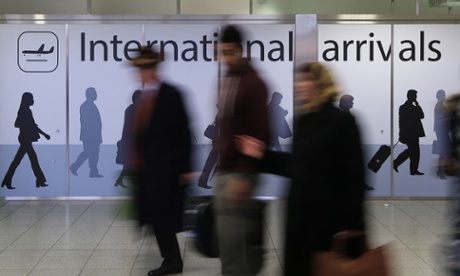
George Osborne’s sunny economic forecast and much of his claim that Britain is a “comeback country” have more to do with higher than expected levels of net inward migration than his stewardship as chancellor or the falling oil price.
That is not a verdict that you are likely to hear from the Conservatives or from Labour for that matter, both of which like to appear as parties opposed to mass migration, but the Office for Budget Responsibility makes clear that it is one key factor fuelling Britain’s economic recovery.
The OBR says the unexpected rise in net migration to 298,000 in the last year – three times higher than the Conservatives’ 100,000 target – has been a factor in its decision to upgrade its forecasts for Britain’s economic growth.
In fact, it calculates that net migration will add 0.6% to the potential output of the British economy and increase net tax receipts rather than be a burden, as most migrants are of working age rather than retired or children. That means that, without continuing high levels of net migration, even deeper spending cuts and higher taxes would be needed before Britain reaches Osborne’s sunshine-filled economic pastures.
As the OBR put it in the economic and fiscal outlook published alongside the budget: “Our previous forecasts have been underpinned by the assumption in the Office for National Statistics’ low migration population projections that net migration will move towards 105,000 a year by mid-2019.
“A reduction over time seems consistent with the international environment and with the government’s declared efforts to reduce it. But in light of recent evidence, it no longer seems central to assume it will decline so steeply. So we now assume that net migration flows will tend towards 165,000 in the long term, consistent with the ONS principal population projections. Relative to our December forecast, this raises potential output growth by 0.5% over the forecast period via 16+ population growth.”
The official economic watchdog says that the age structure of the latest waves of mass migration is skewed to those of working age – they are mostly coming to Britain to work or study. It says this implies that they are just as likely to be employed as those already here and that adds a further 0.1% to the growth in the economy, outweighing potential falls in productivity in the existing UK labour force.
It is all very well, some argue, pointing out that net inward migration fuels the growth in the economy at the national level, but what matters is the impact on the ordinary voter. But the OBR adds that the “GDP per capita” rate – how much it costs or benefits the individual – is also positive due to the higher employment rate.
On top of this, the latest labour market survey figures show that the latest rise in net inward migration does not appear to have led to widespread displacement of existing workers. They show while an extra 239,000 non-UK nationals are in jobs in Britain compared with a year ago, the number of UK nationals in work rose by even more – 375,000.
As a recent University College London study showed, the average profile of a recent migrant is more likely to be a young graduate from western or eastern Europe working in the financial, tech or creative services than our more traditional image of an unskilled migrant labourer.
Neither Conservatives nor Labour, going into a highly charged general election campaign, want to make the link between Britain’s economic recovery and the higher levels of mass migration, but it nevertheless remains a major factor.
After nearly 20 years of continuous mass inward migration to Britain, it is time the politicians stopped pretending that you can have a flourishing modern economy and deep cuts in mass migration. Perhaps it is time they faced up to this new reality and started tackling rather more quickly some of the social problems, including increased pressures on public services, that are also here to stay.

